Samsung Galaxy Book4 Pro 360 Review: A Gorgeous 16" OLED Laptop
Samsung Galaxy Book4 Pro 360 Review: System, Graphics, And Gaming Benchmarks
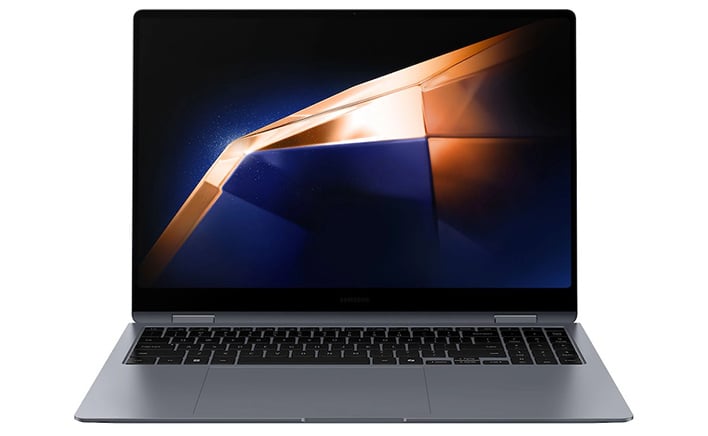
IOMeter Benchmarks
Starting off, we're taking a look at the Galaxy Book4 Pro 360's SSD and how well it performs in IOMeter. We've configured this utility to test sequential write performance at a typical queue depth of eight with a block size of 1MB. Additionally, we filled the SSD up to 50% and 90% full and tested performance under those conditions, as write performance typically declines when a solid state drive runs low on space.While write performance isn't everything, pretty much everyone tends to write heavy files every now and then, whether it's for games, video editing, or backing up data. The SSD tested here is Samsung's own MZVL41T0HBLB-00B, which is not a retail drive but for system integrators.
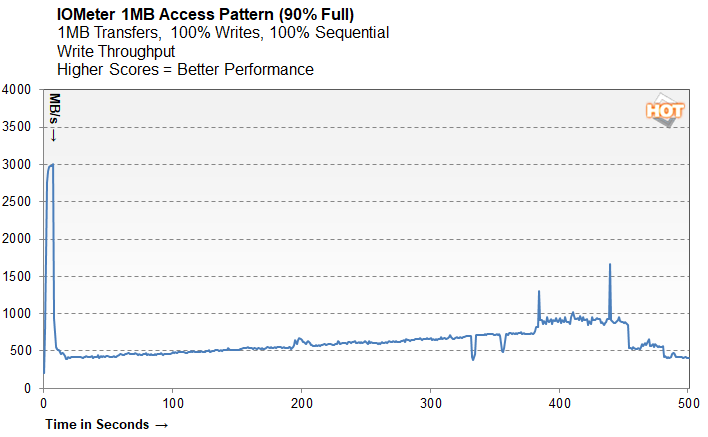
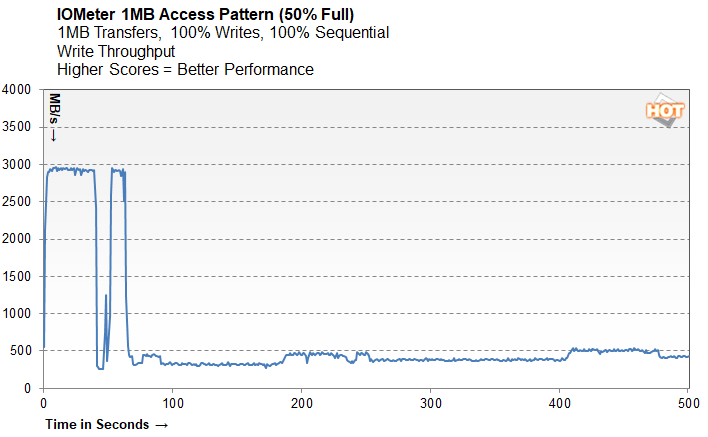
Although the Samsung SSD starts off strong in both the 90% and 50% full test runs, performance eventually declines. In the 90% full run, a speed of roughly 3,000MB/s was sustained for only five seconds before performance drops to just over 400MB/s. Though, performance did steadily improve to about 1,000MB/s over the next few minutes before dropping back down to less than 500MB/s yet again. In the end, the average write speed was 640MB/s. Things look similar in the 50% full test. For about 50 seconds, the SSD was hitting about 3,000MB/s, but afterwards performance dipped into the 300MB/s to 500MB/s range for the remainder of the test. This resulted in an average of 664MB/s for the duration.
To be clear, 650MB/s of write throughput for 200 seconds equates to 130GB, which should be plenty for the overwhelming majority of users. Still, 650MB/s is objectively low by modern standards, and even 3,000MB/s is equivalent to an upper midrange PCIe 3.0 SSD.
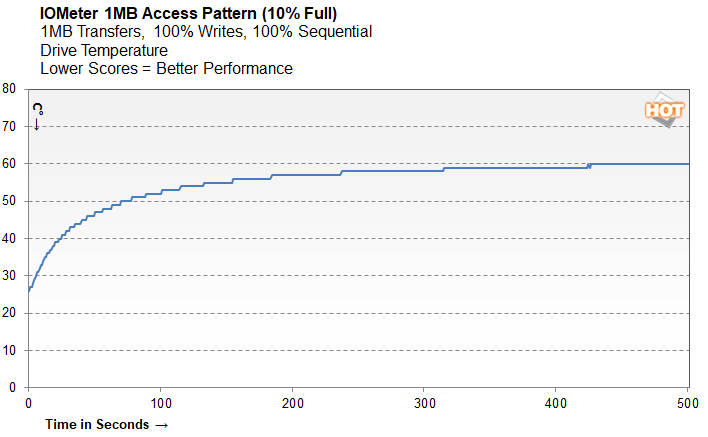
Thankfully, this Samsung SSD hardly breaks a sweat and hit only 60 degrees Celsius after 500 seconds of constant, high-speed writing. It's also interesting that the SSD was sitting in the mid-20s as the test started, which is relatively cool. Both of these things indicate that this SSD probably isn't consuming very much power at all, which would make sense, considering it performance level. For a thin and light laptop, it's a tradeoff that probably makes sense for most mainstream users, and will help with respect to battery life.
ATTO Disk Benchmark
ATTO is a relatively quick acid test to assess sequential performance at differing block sizes. We used ATOO's default settings, which run at a queue depth of four.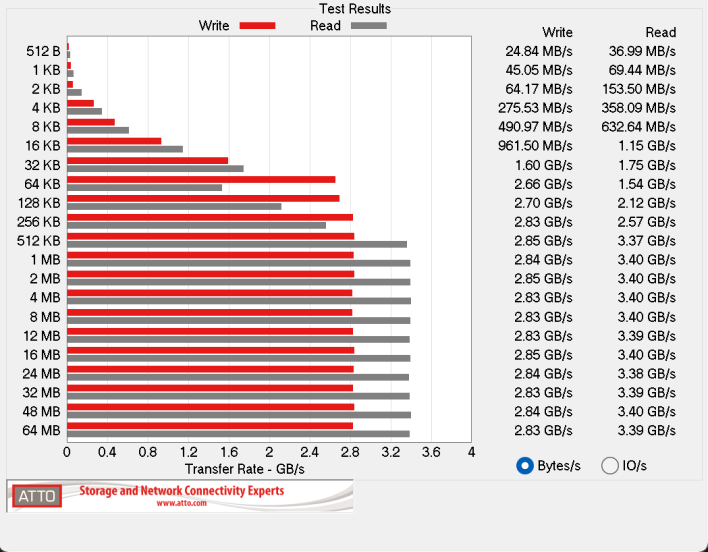
Peak sequential reads and writes were unexceptional, and even the read performance here couldn't saturate a PCIe 3.0 M.2 interface. Still, the SSD's performance is probably sufficient for most users. If anything holds back this SSD in general performance, it's likely to be the writes more than anything.
Speedometer 2.0 Browser Benchmark
To test web browser performance, we used Speedometer 2.0. It repeatedly loads and executes code written in JavaScript, Angular, and other web app-focused languages. It's relatively intensive compared to real world web apps, but it is interesting as a relative performance metric.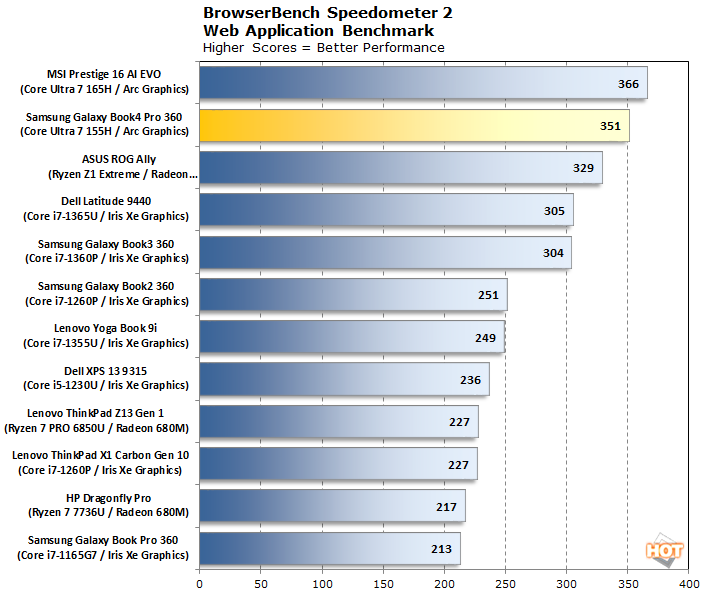
Among lower-power devices, the Galaxy Book4 Pro 360 is at the top of the leaderboard, only behind a Core Ultra 7 165H-powered laptop. The highest scores we've seen in Speedometer 2.0 are in the mid to high 400s, and that's on top-end laptops and desktops, so 351 is a pretty good score here.
Maxon Cinebench 3D Rendering Benchmarks
Cinebench is a CPU (and sometimes GPU) rendering benchmark, and while many different versions have come out over the years, we tested Cinebench R23 and Cinebench 2024. We're also only looking at CPU performance here, and not GPU performance. We used the default settings for Cinebench, which forces the CPU to render for at least few minutes in order to test long-term performance and not just short-term speed.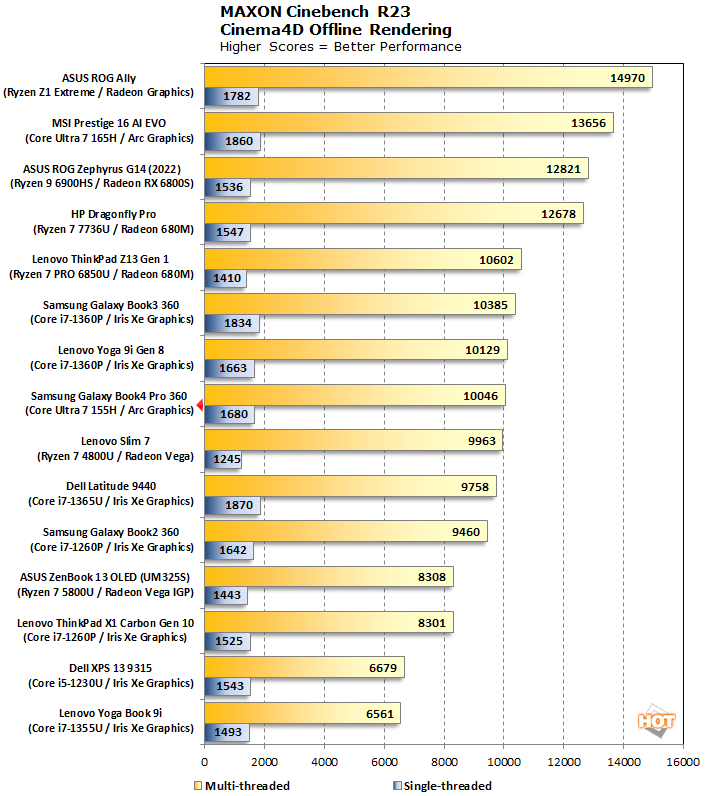
Performance in Cinebench R23 wasn't particularly inspiring. The Galaxy Book4 Pro 360 lost to its predecessor using the Core i7-1360P by a small margin in the multi-threaded test and by a fairly significant amount in the single-threaded test. And while the performance is still fine, trailing versus the previous-gen isn't what you'd normally expect. That being said, Samsung seems to have traded generational gains in some areas for extra efficiency and battery life, which you'll see later.
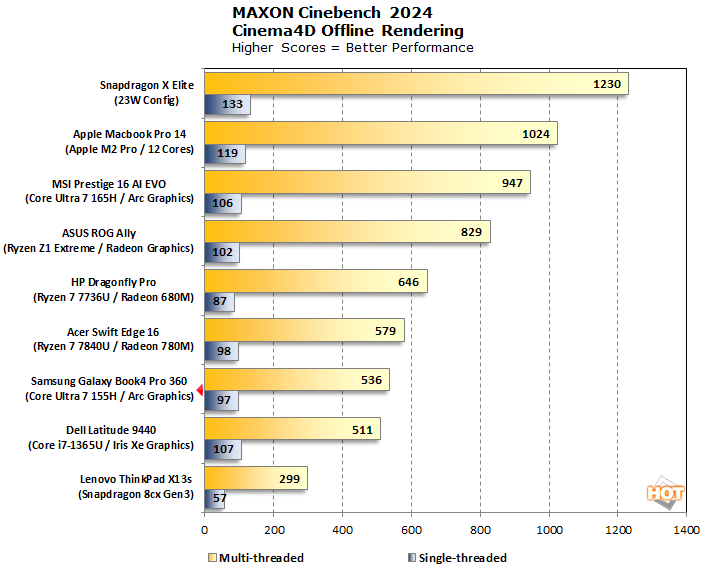
In Cinebench 2024, we can clearly see that the Core Ultra 7 155H lags behind the Apple M2 Pro in the MacBook Pro 14 from 2022 as well as the forthcoming Snapdragon X Elite. Granted, we can see that Meteor Lake can perform closer to these chips as seen with its Core Ultra 7 165H variant in the MSI Prestige 16 AI Evo, but it would have been nice if Samsung's new convertible laptop offered performance competitive with MacBooks.
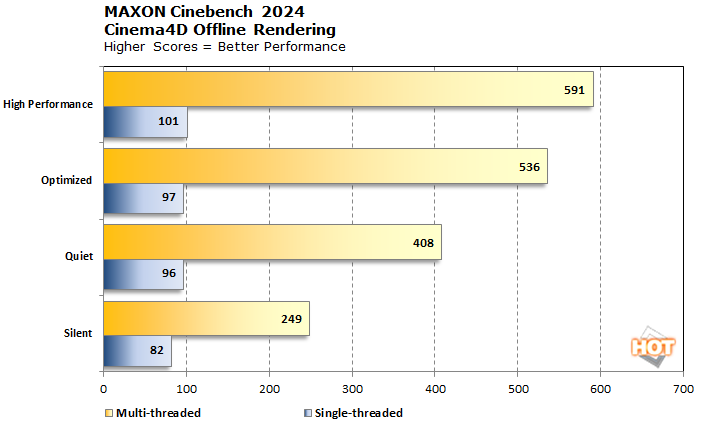
We also ran Cinebench 2024 on the four different power profiles. As a reminder, optimized is the default power profile the Galaxy Book4 Pro 360 employs. High Performance pushes performance a tad more, while Quiet and Silent modes significantly reduce it to keep the fan noise down (or in the case of the Silent profile, eliminating fan noise entirely). While Quiet mode really only sacrifices multi-threaded performance, Silent does see a decent reduction of single-threaded performance as well. Regardless, when it comes to acoustics and battery life, these are nice settings to have on hand, when you want to conserve power or keep the machine quiet.
Geekbench Benchmarks
Geekbench can test CPUs and GPUs in a variety of workloads across a wide range of hardware and software configurations. We've tested CPU performance in both Geekbench 5 and Geekbench 6.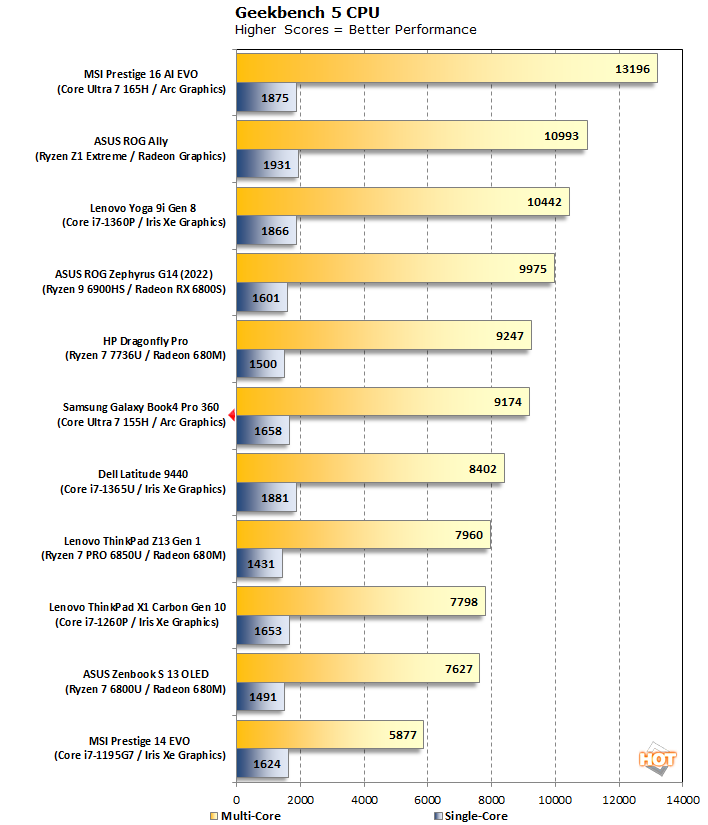
The Core Ultra 7 155H performs decently in Geekbench 5, in both the single- and multi-core parts of the test, but it's not a performance leader. Its single-core performance is low even compared to older 11th and 12th Gen CPUs.
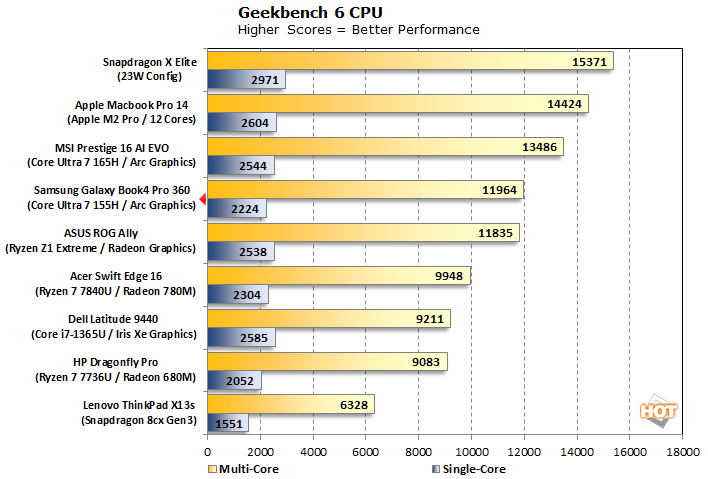
Things aren't much different in Geekbench 6, though the margins look better for the Core Ultra 7 155H here. However, it's notably still pretty far behind the Snapdragon X Elite and the Apple M2 Pro.
PCMark 10 Whole System Benchmarks
PCMark 10 attempts to simulate performance in real world workloads and scenarios, from web browsing to video conferences to 3D rendering. Each workload is scored, then put into one of three categories which are then given a score of their own, and considered together to derive the overall score.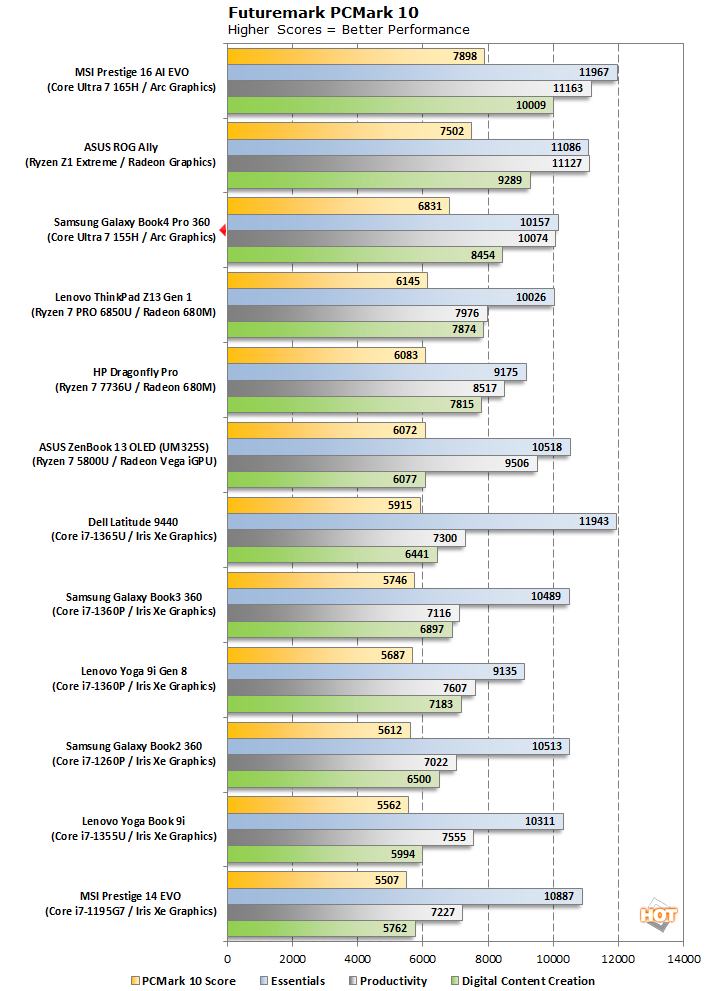
Despite what we've seen in previous benchmarks, the Galaxy Book4 Pro 360 performs admirably here in PCMark's more mainstream computing scenarios. Compared to 13th Gen chips, the Core Ultra 7 155H fares worse in the Essentials category for the most part, but makes big gains in Productivity and Digital Content Creation, resulting in the third-highest score on the chart, behind the Z1 Extreme in the ROG Ally gaming handheld and the Core Ultra 7 165H in the MSI Prestige 16 AI Evo laptop.
UL Procyon Benchmark AI Inferencing Peformance
Procyon by UL (the same company behind PCMark 10) offers some of the only standardized AI PC benchmarks that give you a score that's comparable across wildly different hardware. We ran the AI Computer Vision test (formerly called AI Inference) on the 155H's NPU and GPU in the integer and float16 tests.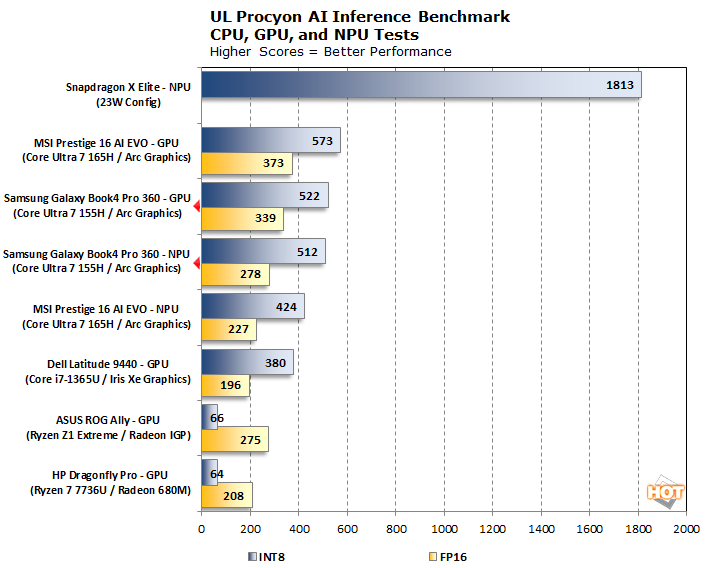
Given that Intel's Meteor Lake prioritizes AI and graphics performance, it's no surprise that the Core Ultra 7 155H on board the Samsung Galaxy Book4 Pro 360 is near the top of the charts, though its NPU is no match for the Snapdragon X Elite's in this test. We'll note the reminder here, however, that Snapdragon X Elite laptops are not on the market at this time, and this was a score we pulled from a prototype machine that Qualcomm gave us access to. Regardless, this forthcoming SoC beat the Core Ultra 7 165H's NPU in the MSI Prestige 16 AI Evo as well. However, maybe down the road software updates and optimizations for Meteor Lake will lift performance for Intel's platform a bit. AI benchmarks are definitely a moving target at this time. In addition, while we don't have a Ryzen 8000 series laptop comparisons here yet, Intel clearly beat the Ryzen 7000 series-powered HP Dragonfly Pro.
3DMark Graphics and CPU Tests
3DMark (also made by UL) tests graphics performance and offers a variety of different tests to do so. We used the lighter Night Raid test and the older Fire Strike Extreme benchmark to evaluate the Core Ultra 7 155H's integrated graphics.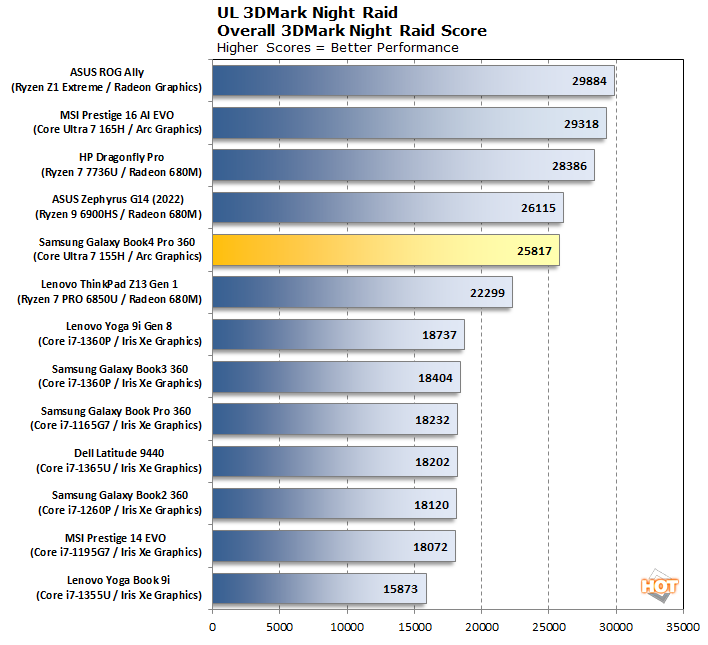
In Night Raid, the Core Ultra 7 155H on board Samsung's new laptop is significantly ahead of the Iris Xe iGPUs paired with 13th Gen CPUs. It matches the Radeon 680M in high-end Ryzen 6000 APUs, but falls behind the Radeon 780M and the Core Ultra 7 165H's graphics. Given that the Arc graphics in the 155H has all available cores, the reason for the lower performance is probably due to lower clock speeds and power constraints, which is understandable for a thin and light laptop.
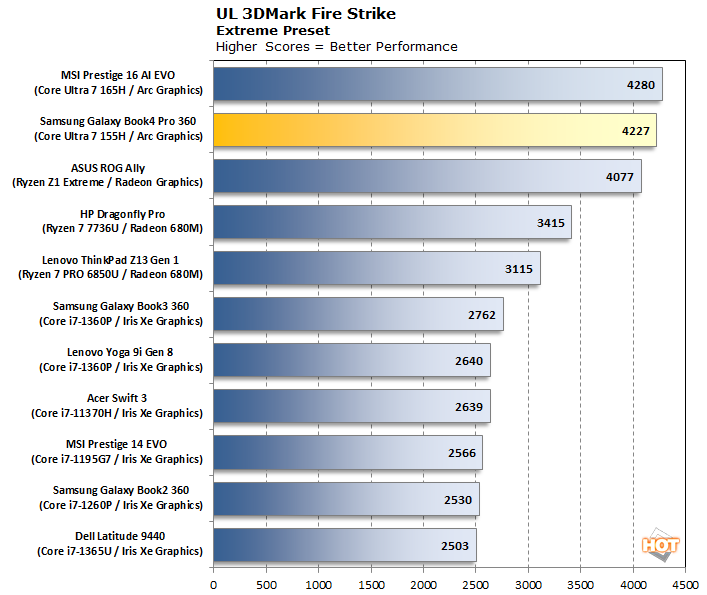
In Fire Strike Extreme, the new Samsung Galaxy Book4 Pro 360 jumps up to near the top of the charts again, and is just a tad behind the Core Ultra 7 165H-powered MSI machine. Fire Strike is older, shorter, and includes CPU testing, which is presumably why the 155H performs so much better here than it did in Night Raid.






